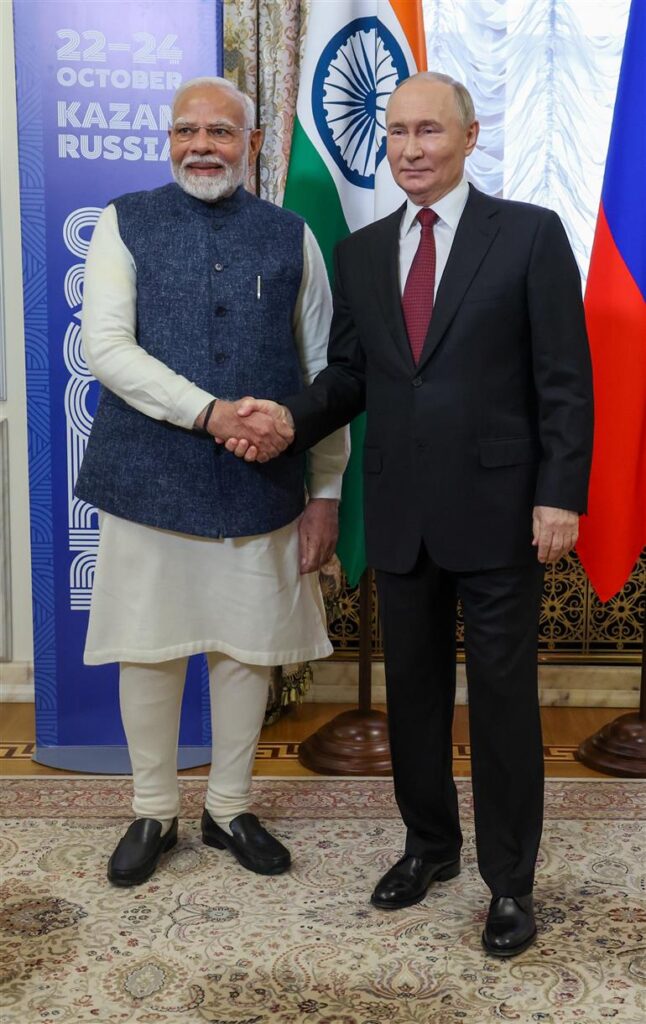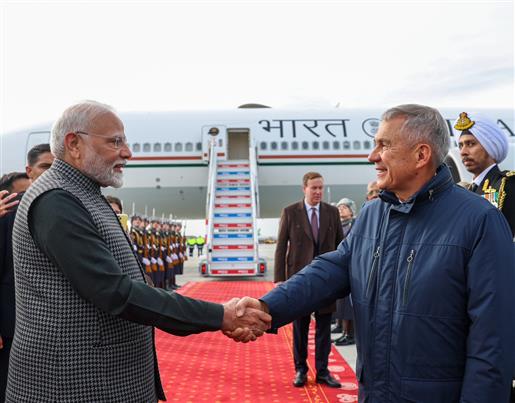Moscow, October 22, 2024 – As part of the 16th BRICS Summit, Prime Minister Modi’s Visit to Russia, at this juncture will have a global political impact. In the face of altering global geopolitics, this two-day event is anticipated to strengthen India’s bilateral ties with Russia and further secure its position within the BRICS framework (Brazil, Russia, India, China, and South Africa).
The 16th BRICS Summit is expected to cover a broad range of international topics, including climate change, economic cooperation, and reforms in multilateral organizations like the UN. “India values the close cooperation within BRICS, which has emerged as an important platform for dialogue and discussion on issues concerning the global developmental agenda,” Prime Minister Modi stressed before his departure.
This year’s BRICS Summit is especially significant given the expansion of BRICS, with new members added last year, further strengthening the group’s diversity and inclusivity. Modi’s visit aims to deepen the discourse on economic recovery in a post-pandemic world, enhance cooperation in technology, and promote sustainable development initiatives.
One major expectation is India’s continued advocacy for reformed multilateralism, which seeks to reshape the global governance architecture to make it more reflective of current realities. Climate change is also high on the agenda, with India pushing for more robust commitments to combat global warming.
India-China Border Agreement
In a parallel diplomatic breakthrough, Prime Minister Modi’s visit is also overshadowed by the recent agreement between India and China concerning their long-standing border disputes. After years of military tensions and occasional clashes along the Line of Actual Control (LAC), India and China have finally reached a preliminary understanding to de-escalate their border disputes. This agreement focuses on establishing a series of confidence-building measures, joint military exercises, and the gradual withdrawal of forces from contested areas, signalling a significant reduction in hostilities.
The impact of this agreement is expected to be far-reaching. For India, resolving the border tensions with China would allow greater focus on its domestic and international economic agenda, particularly in bolstering trade partnerships and infrastructure development. It will also free up military resources, previously tied up at the border, for modernization and other strategic priorities.
China, too, benefits from a reduction in tensions, as it shifts focus from border skirmishes to its larger geopolitical ambitions in Asia. This agreement also aligns with China’s broader goal of stabilizing its borders while it faces increased scrutiny from the West.
International Consequences of India-China Agreement
PM Modi’s involvement in the BRICS Summit carries significant international consequences, especially in light of the border agreement with China. His participation underscores India’s growing influence within BRICS and its ambition to play a central role in shaping the global development and security agenda. India’s improved relations with China may also serve to recalibrate regional power dynamics, especially concerning its strategic partnerships with the United States.
The United States is likely to view the India-China border agreement with a degree of caution. While the US sees India as a vital partner in the Indo-Pacific and a counterbalance to China’s rising influence, any de-escalation between India and China could signal a shift in regional alliances. Washington may perceive this agreement as reducing India’s reliance on the US in countering China, potentially complicating its own Indo-Pacific strategy.
However, India’s balanced diplomacy historically navigates competing interests between the US, China, and Russia. Modi’s participation in the BRICS Summit and his government’s engagement with both China and Russia may reinforce India’s position as an independent power, emphasizing strategic autonomy without fully aligning with any particular bloc.
The BRICS summit provides an opportunity for deeper trilateral discussions between Russia, China, and India. With India’s successful border agreement with China, there is potential for broader cooperation between the three major powers. While each country’s strategic interests differ, the meeting may foster a deeper understanding of common goals such as economic cooperation, technological innovation, and reforming global financial institutions to reflect the interests of emerging markets.
Moreover, the alignment of these three superpowers, particularly within BRICS, could signal a shift in the global power structure. If India, China, and Russia find common ground on economic cooperation and reducing dependence on Western financial systems, it could have long-term implications for global trade and governance. Such cooperation may also create friction with the US and its allies, as it challenges the existing dominance of Western-led institutions like the World Bank and the International Monetary Fund (IMF).
Prime Minister Modi’s visit will also focus on reinforcing India’s strategic partnership with Russia, especially following their bilateral summit in July 2024. India and Russia have historically maintained close ties, but this visit comes at a time of heightened tensions between Russia and the West due to the ongoing Ukraine conflict. Modi’s participation will likely reaffirm India’s neutral stance, promoting a diplomatic approach to conflict resolution.

“Building upon the Annual BRICS Summit held in July 2024 in Moscow, my visit to Kazan will further reinforce the Special and Privileged Strategic Partnership between India and Russia,” Prime Minister Modi stated, signalling India’s intent to strengthen ties with Russia while balancing its relationships with other global powers.
The evolving dynamics between India, China, and Russia could also set the stage for new global alignments, particularly in the context of economic and security cooperation, which may challenge the established world order led by the West.






